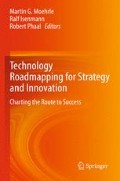Abstract
In companies there are many different variants of technology roadmapping in use (see the different chapters in this book). Each variant requires a specific process, in order to forecast future technologies concerning content and time. For this purpose tools from the theory of inventive problem solving are suggested in the following essay, in particular trends of technical systems evolution. They do not replace conventional creative thinking, but supplement it, and lead it in promising directions. Combined with a comprehensive process for the technology roadmapping they unfold their full effect.
Access this chapter
Tax calculation will be finalised at checkout
Purchases are for personal use only
Preview
Unable to display preview. Download preview PDF.
References
Ahmed, P.K., Shepherd, C.D.: Innovation management. In: Harlow, et al. (eds.) Context, Strategies, Systems and Processes. Prentice Hall (2010)
Altschuller, G.S.: Erfinden - Wege zur Lösung technischer Probleme, 2nd edn. Planung und Innovation, Cottbus (1998)
Burgelman, R.A., Christensen, C.M., Wheelwright, S.M.: Strategic management of technology and innovation, 4th edn. McGraw-Hill, Boston (2004)
Geschka, H., Dahlem, S.: Kreativitätstechniken und Unternehmenserfolg. Technologie & Management 46(3), 106–110 (1996)
Gustafsson, A., Herrmann, A., Huber, F.: Conjoint measurement: methods and applications. Springer, Heidelberg (2007)
Hauschildt, J., Salomo, S.: Innovationsmanagement. Vahlen, Munich (2010)
Herb, R., Herb, T., Kohnhauser, V.: TRIZ - der systematische Weg zur Innovation. Moderne Industrie, Landsberg am Lech (2000)
Ideation International (ed.) Innovation WorkBench 2000 (software product), Detroit, Michigan (2000)
Invention Machine (ed.) TechOptimizer Professional Edition 4.0 (software product), Boston, Massachussetts (2002)
Isaksen, S.G., Treffinger, D.J.: Creative approaches to problem solving: a framework for innovation and change. Sage, Thousand Oaks (2010)
Linde, H., Hill, B.: Erfolgreich erfinden. Widerspruchsorientierte Innovationsstrategie. Hoppenstedt, Darmstadt (1993)
Mann, D.: Hands-on systematic innovation. CREAX, Ieper/Belgium (2002)
Moehrle, M.G., Lessing, H.: Profiling technological competencies of companies: a case study based on the Theory of Inventive Problem Solving. Creativity and Innovation Management 13(4), 231–239 (2004)
Moehrle, M.G.: What is TRIZ? From conceptual basics to a framework for research. Creativity and Innovation Management 14(1), 3–13 (2005)
Moehrle, M.G.: MorphoTRIZ - Combining morphological and contradiction-oriented problem solving to solve vague technical problems. Creativity and Innovation Management 19(4), 373–384 (2010)
Pahl, G., Beitz, W., Schulz, H.-J., Jarecki, U., Wallace, K., Blessing, L.T.M.: Engineering design: a systematic approach, 3rd edn. Springer, London (2007)
Pannenbäcker, T.: Methodisches Erfinden in Unternehmen. Bedarf, Konzept, Perspektiven für TRIZ-basierte Erfolge. Brandenburgische Technische Universität Cottbus: Dissertation (2001)
Rothwell, R.: Towards the fifth-generation innovation process. In: Henry, J., Mayle, D. (eds.) Managing Innovation and Change. Sage, London (2002)
Specht, G., Behrens, S.: Strategische Planung mit Roadmaps. Möglichkeiten für das Innovationsmanagement und die Personalbedarfsplanung. In: Moehrle, M.G., Isenmann, R. (eds.) Technologie-Roadmapping. Zukunftsstrategien für Technologieunternehmen, pp. 85–104. Springer, New York (2002)
Zobel, D.: Systematisches Erfinden. Methoden und Beispiele für den Praktiker. Expert, Renningen (2001)
Zwicky, F.: Entdecken, erfinden, forschen im morphologischen Weltbild, 2nd edn. Baeschlin, Glarus (1989)
Author information
Authors and Affiliations
Corresponding author
Editor information
Editors and Affiliations
Rights and permissions
Copyright information
© 2013 Springer-Verlag Berlin Heidelberg
About this paper
Cite this paper
Moehrle, M.G. (2013). TRIZ-Based Technology Roadmapping. In: Moehrle, M., Isenmann, R., Phaal, R. (eds) Technology Roadmapping for Strategy and Innovation. Springer, Berlin, Heidelberg. https://doi.org/10.1007/978-3-642-33923-3_9
Download citation
DOI: https://doi.org/10.1007/978-3-642-33923-3_9
Publisher Name: Springer, Berlin, Heidelberg
Print ISBN: 978-3-642-33922-6
Online ISBN: 978-3-642-33923-3
eBook Packages: EngineeringEngineering (R0)

